Daily Vocabulary Words: Enhance Your Lexicon with Leading Newspapers & Publications
Welcome to the Daily Vocabulary section at Wordpandit!
Our mission is straightforward: to bring you essential vocabulary words featured in top newspapers and publications worldwide. By focusing on words you’ll encounter in renowned sources, we aim to help you enhance your vocabulary effectively and practically.
Our selection includes words from:
– The New York Times
– The Washington Post
– Scientific American
– BBC
– The Guardian
– Psychology Today
– Wall Street Journal
– The Economist
– The Hindu
– The Times of India
– The Economic Times
– Hindustan Times
– Live Mint
– The Indian Express
– And many more.
We are committed to your vocabulary development. Simply visit this section regularly and explore the daily posts. This is your go-to repository for commonly used words, providing significant practical benefits by familiarizing you with vocabulary from the leading publications listed above.
Make it a habit to visit our website daily and expand your lexicon with words from top newspapers and publications.
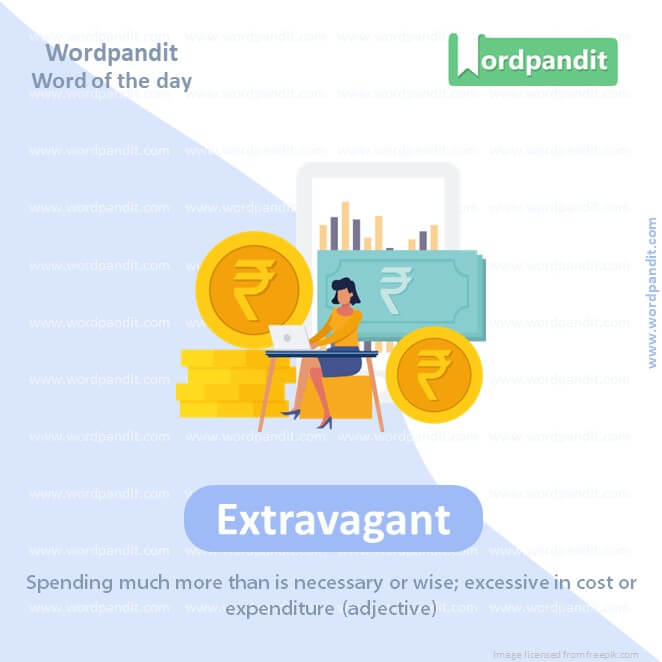
WORD-1: Extravagant
CONTEXT: They dress up for “thirst trap” parties, compliment each other’s boobs and delight in objectifying Minogue – who plays up to it with a succession of extravagant outfits.
SOURCE: Guardian
EXPLANATORY PARAGRAPH: Imagine you go to a store and see a toy that’s really, really big and sparkles more than any other toy. It’s so special that it costs a lot of money—much more than usual toys. When something is like that toy, big, special, and costing a lot of money, we call it “extravagant.” It’s like when you use a lot of crayons to color just one picture!
MEANING: Spending much more than is necessary or wise; excessive in cost or expenditure (adjective).
PRONUNCIATION: ex-TRAV-uh-gant
SYNONYMS: lavish, excessive, over-the-top, opulent, costly, luxurious
USAGE EXAMPLES:
1. She wore an extravagant dress to the party that sparkled under the lights.
2. The extravagant wedding had fireworks and a huge cake.
3. Buying a big, extravagant toy might not leave you with enough money for other things.
4. His extravagant lifestyle included trips to exotic places and dining at the finest restaurants.
WORD-2: Queered
CONTEXT: the lengthy process is put in place to ensure that the best interests of the child are served, the non-availability of babies for adoption has queered the pitch, allowing the demand to seek supply avenues by hook or by crook.
SOURCE: The Hindu
EXPLANATORY PARAGRAPH: Imagine you’re building a tower with blocks, and just when it’s almost finished, your little brother bumps into it, making it wobble and look all funny. When something gets messed up or turns out different from what everyone expected, like your tower, we can say it got “queered.”
MEANING: Made something deviate from what is expected; spoiled or ruined (verb).
PRONUNCIATION: KWEERD
SYNONYMS: ruined, spoiled, botched, messed up, thwarted
USAGE EXAMPLES:
1. The rain queered our plans for a picnic.
2. A sudden power outage queered the theater performance last night.
3. He felt his chances were queered by arriving late at the interview.
4. The surprise guest queered the host’s plans for the event.
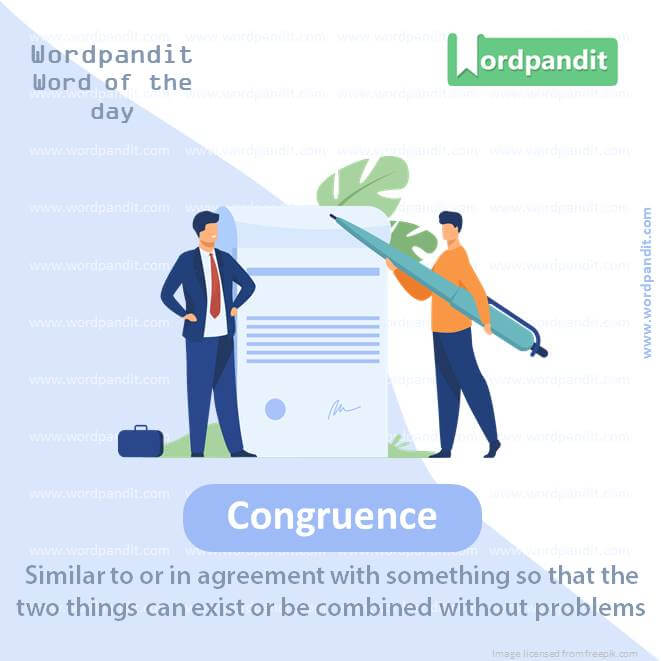
WORD-3: Congruence
CONTEXT: After giving the party several chances and grappling with their choices, the decision not to vote gave them a sense of congruence.
SOURCE: Guardian
EXPLANATORY PARAGRAPH: When you put together a puzzle, all the pieces have to fit perfectly to make the right picture, right? “Congruence” is when things fit together just right, like puzzle pieces that match up perfectly.
MEANING: Similar to or in agreement with something so that the
two things can exist or be combined without problems.
PRONUNCIATION: KON-groo-ence
SYNONYMS: harmony, agreement, consistency, correspondence, alignment
USAGE EXAMPLES:
1. There was a perfect congruence between the two reports.
2. He noted the congruence of their goals and ideas.
3. The congruence of the patterns made the design look beautiful.
4. Their opinions showed congruence on the matter discussed.
WORD-4: Alleviation
CONTEXT: The government needs to do many things at once to ensure such incidents do not occur again: provide effective poverty alleviation schemes; employment opportunities for youth; generate awareness about adoption schemes for both biological and adoptive parents; remove unnecessary bureaucratic processes in adoption, and ensure effective policing to nip such plots in the bud.
SOURCE: Hindustan times
EXPLANATORY PARAGRAPH: Imagine if you’re carrying a really heavy backpack, and it’s making you tired and a bit sore. If someone comes and takes something heavy out of it, it feels lighter, right? “Alleviation” is like when something makes a pain, problem, or something difficult feel lighter and less bothersome.
MEANING: The act of making something less severe or more bearable (noun).
PRONUNCIATION: uh-LEE-vee-AY-shun
SYNONYMS: relief, easing, mitigation, reduction, lessening
USAGE EXAMPLES:
1. Taking medicine led to the alleviation of her headache.
2. The new policies brought alleviation to the overcrowded classrooms.
3. He found that talking to a friend was a great alleviation of his worries.
4. The charity works for the alleviation of poverty.
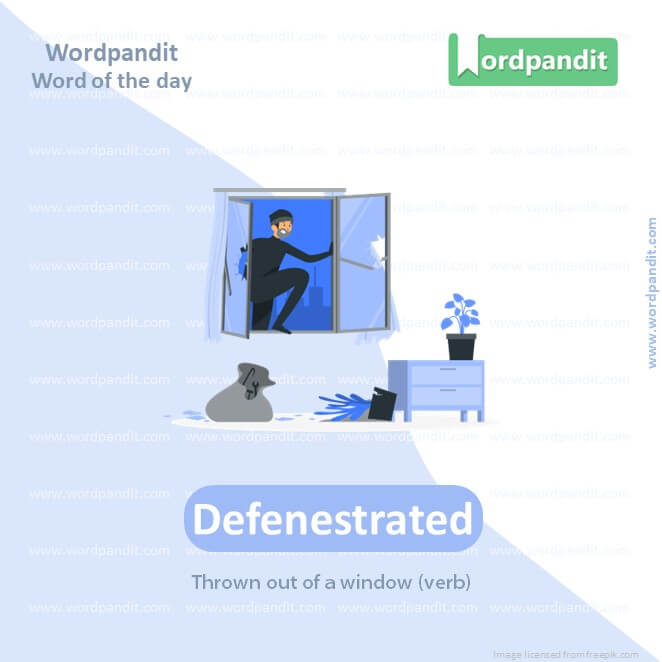
WORD-5: Defenestrated
CONTEXT: Ignore that sense of empowering divestment or scold people for acting on it at your peril, as Labour found out when it thought that Abbott could be defenestrated without a fuss.
SOURCE: Guardian
EXPLANATORY PARAGRAPH: Imagine if you opened your window and threw your teddy bear outside. That’s a bit like “defenestrated.” It means to throw something or someone out of the window.
MEANING: Thrown out of a window (verb).
PRONUNCIATION: dee-FEN-eh-stray-ted
SYNONYMS: ejected, expelled, tossed out, thrown out, cast out
USAGE EXAMPLES:
1. The old, broken printer was humorously defenestrated during the office clean-up.
2. In the movie, the villain was defenestrated in a dramatic scene.
3. He joked about defenestrating his old notes after the semester ended.
4. The concept of being defenestrated sounds frightening and dangerous.
WORD-6: Irreverence
CONTEXT: he did not conceal his irreverence for the idea of India — a value system that regards all citizens as equal stakeholders in the progress of the nation.
SOURCE: The Hindu
EXPLANATORY PARAGRAPH: Imagine you’re at a very quiet place where everyone is supposed to be serious, like a library, and someone starts making silly faces or laughing loudly. That’s being “irreverent.” It means not showing the usual respect where it’s expected.
MEANING: A lack of respect for people or things that are generally taken seriously (noun).
PRONUNCIATION: i-REV-er-ence
SYNONYMS: disrespect, disregard, impertinence, cheekiness, insolence
USAGE EXAMPLES:
1. His irreverence towards the school rules often got him in trouble.
2. There was a tone of irreverence in his speech that surprised the formal audience.
3. The comedian’s irreverence for political figures made his show very popular.
4. She admired the playful irreverence of the young artist’s work.
WORD-7: Galvanising
CONTEXT: there is galvanising clarity, unifying across their disparate groups.
SOURCE: Guardian
EXPLANATORY PARAGRAPH: Imagine if you saw a superhero movie and then wanted to dress up and pretend to be a superhero too. That feeling that makes you want to get up and do something exciting is called “galvanising.” It’s when something or someone encourages you to start moving or doing something right away.
MEANING: Stimulating someone to take action, especially by exciting enthusiasm or urgency (verb).
PRONUNCIATION: GAL-vuh-nize-ing
SYNONYMS: energizing, inspiring, motivating, arousing, stirring up
USAGE EXAMPLES:
1. The coach’s speech was so galvanising that the team felt ready to win.
2. The documentary was galvanising, making many viewers want to help the cause.
3. Her words were galvanising, urging everyone to volunteer for the community project.
4. The crisis was galvanising, leading to rapid changes in policy.
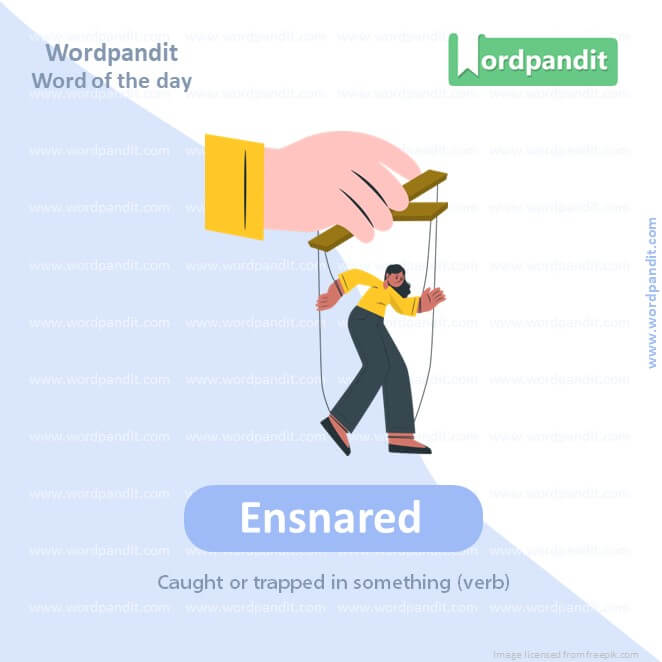
WORD-8: Ensnared
CONTEXT: I’ve ensnared you with an autostereotype, a belief about one’s own social or political group.
SOURCE: Guardian
EXPLANATORY PARAGRAPH: Imagine playing in the garden and accidentally stepping into a net that was hidden among the leaves, and now you can’t get out easily. That’s being “ensnared.” It’s like getting caught or trapped in something when you least expect it.
MEANING: Caught or trapped in something (verb).
PRONUNCIATION: en-SNAYRD
SYNONYMS: trapped, caught, entangled, ensnared, captured
USAGE EXAMPLES:
1. The rabbit was ensnared in the garden net.
2. He felt ensnared by his own promises, unable to back out now.
3. The new policy ensnared many people in unexpected paperwork.
4. The villain’s plan was to ensnare the heroes in a trap.
WORD-9: Worsening
CONTEXT: Scientists predict that 2024 could be similar. With global emissions still growing, climate impacts are worsening. Heatwaves are sweeping through the Indian sub-continent.
SOURCE: The Hindu
EXPLANATORY PARAGRAPH: Imagine if you have a small cut on your hand and instead of taking care of it, you keep scratching it. The cut gets bigger and more painful. That’s what “worsening” means—it’s when something bad gets even worse.
MEANING: Becoming more severe or serious (verb).
PRONUNCIATION: WUR-suh-ning
SYNONYMS: deteriorating, declining, degenerating, exacerbating, degrading
USAGE EXAMPLES:
1. The weather is worsening, so we might need to cancel our plans.
2. His health was worsening despite the treatment.
3. The economic situation was worsening, causing concern among citizens.
4. Continued pollution is worsening the air quality.
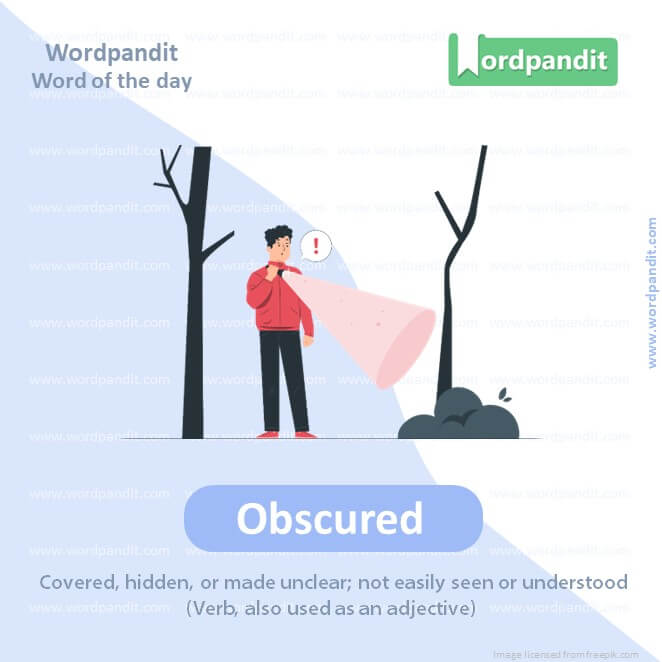
WORD-10: Obscured
CONTEXT: In my eyes – and I strongly believe I am not the only one – independence and sovereignty are watered down every time an ethical decision is obscured by a set of conditions or postponed.
SOURCE: Guardian
EXPLANATORY PARAGRAPH: Imagine drawing a picture with bright, clear colors, and then someone puts a foggy piece of glass over it. Now your picture isn’t easy to see—it’s “obscured.” It means something is hidden or not clear anymore.
MEANING: Covered, hidden, or made unclear; not easily seen or understood
(Verb also used as an adjective).
PRONUNCIATION: ob-SKYURD
SYNONYMS: concealed, hidden, veiled, shrouded, masked, clouded
USAGE EXAMPLES:
1. The view was obscured by the heavy fog.
2. His intentions were obscured by his complex language.
3. She found an old, obscured painting in the attic.
4. The details of the story were obscured over time.
Vocabulary Daily Use
In the fascinating world of language learning, we often concentrate on taking giant leaps, but the real magic lies in the small steps of ‘vocabulary daily use’. These frequently used words and phrases form the backbone of practical communication and understanding. Therefore, mastering ‘vocabulary daily use’ is a crucial element in achieving language fluency.
To effectively learn ‘vocabulary daily use’, one needs to venture beyond the traditional textbook resources. The real essence of these words unveils itself in everyday exposure and interactions. Engaging with a variety of material like novels, magazines, newspapers, podcasts, films and digital content deepens the understanding of ‘vocabulary daily use’. Immersion in these contexts yield natural, everyday language that bridges the gap between the classroom and the real world.
The journey of mastering ‘vocabulary daily use’ necessitates the integration of innovative memory techniques. Flashcards and the Leitner System aid in embedding these words into your long-term memory by promoting active recall. Additionally, the use of mnemonic devices, which allow you to associate ‘vocabulary daily use’ with personal and familiar narratives, can enhance your ability to remember and recall these words.
Moreover, it’s important to remember that ‘vocabulary daily use’ isn’t just about comprehension- it’s about practice and active usage. Incorporate these words in your day-to-day communication and social interactions. This not only solidifies your understanding but also accelerates learning and internalization of ‘vocabulary daily use’.
In a nutshell, mastering ‘vocabulary daily use’ is a continual process that demands exposure, creative learning strategies and assertive practice. The commingling of these tactics brews the perfect formula that allows learners to seamlessly integrate ‘vocabulary daily use’ into their linguistic repertoire. And with that, they can navigate the nuances of language with confidence and ease.













